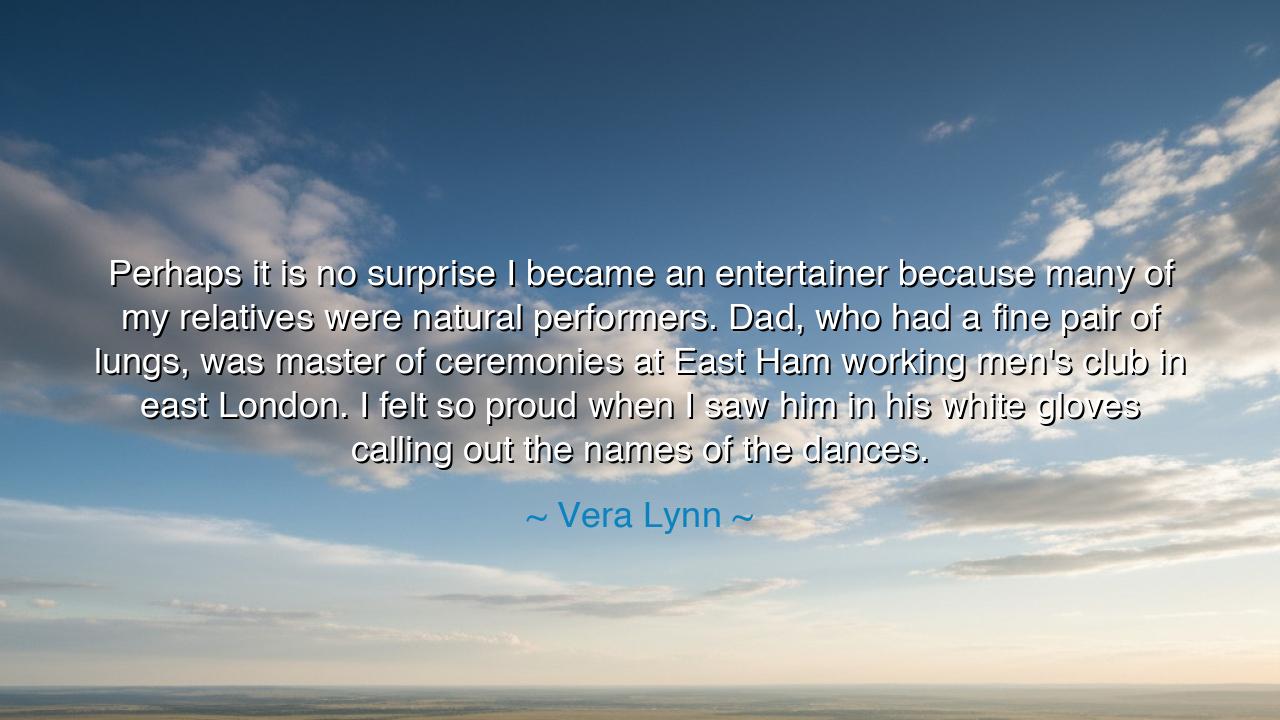
Perhaps it is no surprise I became an entertainer because many of
Perhaps it is no surprise I became an entertainer because many of my relatives were natural performers. Dad, who had a fine pair of lungs, was master of ceremonies at East Ham working men's club in east London. I felt so proud when I saw him in his white gloves calling out the names of the dances.






When Vera Lynn said, “Perhaps it is no surprise I became an entertainer because many of my relatives were natural performers. Dad, who had a fine pair of lungs, was master of ceremonies at East Ham working men’s club in east London. I felt so proud when I saw him in his white gloves calling out the names of the dances,” she spoke not only of family, but of inheritance, of the sacred thread that binds generations through love, talent, and the human need to express. In her words lives the echo of countless souls who find their calling not by chance, but by lineage — a gift passed not through wealth or instruction, but through the living fire of example. The entertainer was born from the heart of the entertainer before her; her art was not learned, but awakened.
This quote is a portrait of the seed of destiny, quietly planted in childhood. When she speaks of her father, clad in white gloves and commanding the joy of a dance hall, we glimpse the moment where admiration became aspiration. For every child who watches a parent at their best — proud, graceful, confident — something eternal stirs within. Vera Lynn saw not merely her father’s craft, but the beauty of connection, of giving delight to others through presence and voice. In that moment, she did not just see him — she saw what she might one day become. Thus, her father’s song became her own, carried forward on the breath of love and memory.
In ancient times, this was known as the inheritance of spirit — the belief that the soul of the parent finds a new vessel in the child’s deeds. The sculptor’s son would carve stone with the same reverence as his father, the bard’s daughter would sing the same old tunes, reshaped by her own voice. So it was with Vera Lynn, who would one day sing the songs that lifted an entire nation through war and grief. The voice that once filled small halls in East London became the voice that filled the hearts of soldiers far from home. She had taken her father’s love of performance and magnified it into a calling of comfort, proving that the seeds planted in ordinary lives can grow into flowers of extraordinary grace.
Consider the story of Leonardo da Vinci, born the illegitimate son of a notary and a peasant woman. Though his parents’ worlds were divided by class, he inherited something from each — his father’s precision, his mother’s imagination. From those quiet beginnings came one of history’s greatest minds. Just as Vera Lynn drew from her father’s commanding voice, Leonardo drew from the dual inheritance of intellect and intuition. Both understood that greatness does not appear from nowhere; it blossoms from the soil of heritage. And when one honors that heritage with love, it transforms from mere bloodline into destiny.
Yet Vera Lynn’s words also carry a tenderness that speaks to humility — the knowledge that even the grandest achievements begin in small, human places. She does not boast of her fame, nor separate herself from her roots. Instead, she returns to the image of her father in his white gloves — a man of the people, bringing joy to his community. There is holiness in that memory, for it reminds us that true artistry is not about applause or grandeur, but about connection. The entertainer’s duty is to unite hearts, to remind people of beauty and belonging. The great Vera Lynn, whose songs sustained soldiers through the darkness of war, never forgot that lesson.
In her recollection, we are reminded of another truth: pride in one’s origins is the foundation of authenticity. To forget where we come from is to forget who we are. The ancients taught that a tree without roots cannot stand, no matter how tall it grows. By honoring her father, Vera Lynn honored herself, for she recognized that every triumph she achieved was built upon the hands, the voice, and the courage of those who came before. This is the wisdom of the ages — to see greatness not as an isolated gift, but as a shared flame, passed lovingly from one soul to another.
So, my listener, take this teaching to heart: remember your beginnings. Whether your inheritance is in song, kindness, endurance, or craft, it is sacred. Look back with gratitude upon those who shaped you, not because they were perfect, but because they gave you the tools to become yourself. Nurture what they have given you. Refine it, expand it, carry it forward. And when your time comes, pass it on — not in words alone, but in the living example of your work, your joy, your compassion.
For this is how legacies are born. The father in the dance hall becomes the daughter who sings for nations; the small voice in one lifetime becomes the chorus of another. The cycle continues, not through fame, but through faithfulness — through love made visible. And so long as there are children who look upon their parents with wonder, and say, “Perhaps it is no surprise I became who I am,” the light of humanity will never go out.






AAdministratorAdministrator
Welcome, honored guests. Please leave a comment, we will respond soon